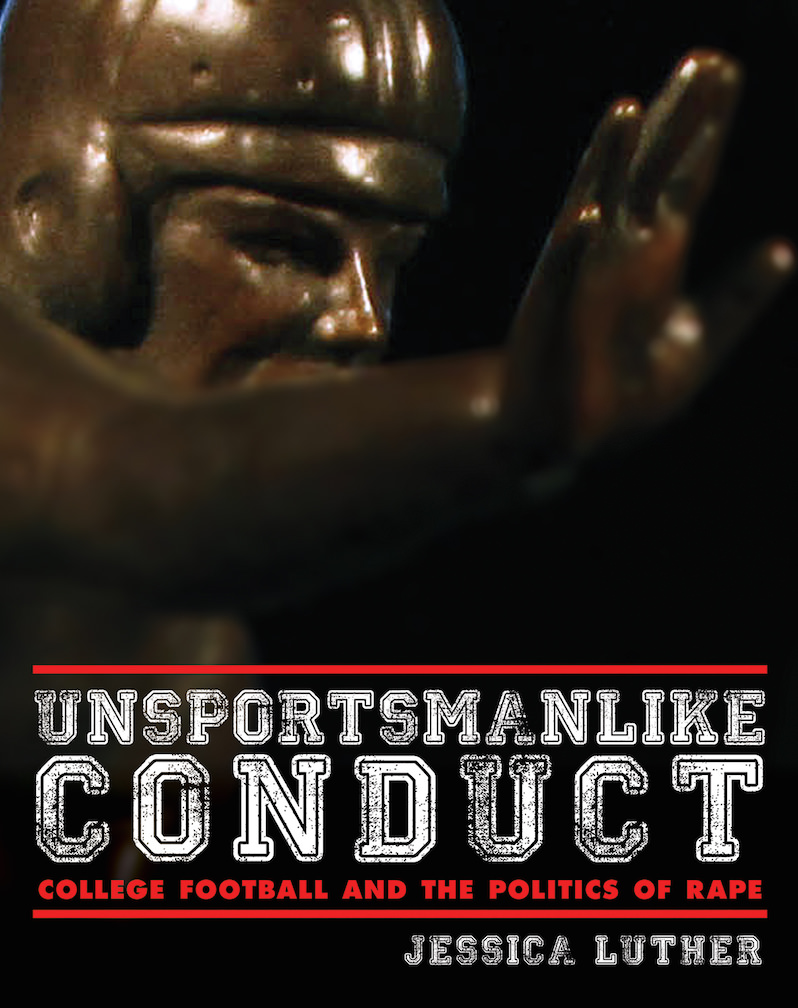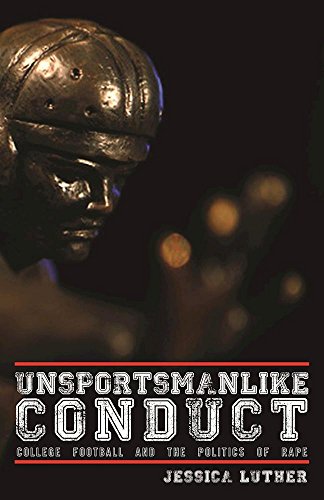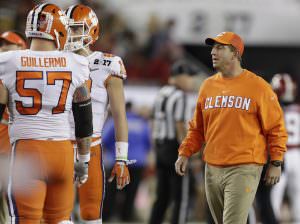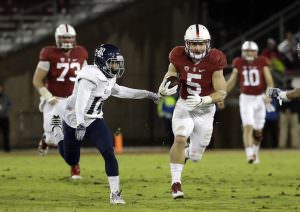Understanding Trauma Is an Important Part of Every Sexual Violence Story
To have a better conversation about the problem, within college football and beyond, we need to examine how trauma affects the brain The Jameis Winston case works well for this To have a better conversation about the problem, within college football and beyond, we need examine how trauma affects the brain .
“Unsportsmanlike Conduct” exposes the epidemic of cover-up that surrounds sexual assault and college football players. (Akashic Books)
The following excerpt is from “Unsportsmanlike Conduct: College Football and the Politics of Rape,” copyright 2016 by Jessica Luther, used with permission of Akashic Books and Edge of Sports
There is ample fascination with how people who report traumatic violence change their stories. So much time is spent nitpicking details from different interviews, depositions, and testimonies of the person reporting, and it is pretty common to find inconsistencies. That is a trademark of experiencing trauma.
If we are going to ever have a better conversation about this problem, within college football and beyond, we need a better understanding of how trauma affects the brain. The Jameis Winston case works well for this.
One of the biggest questions around [Erica] Kinsman’s case is the possibility of a drink she had that night being drugged. In the documentary “The Hunting Ground,” which premiered on Jan. 23, 2015 at the Sundance Film Festival, Kinsman says on camera, “I’m fairly certain that there was something in that drink.” But two separate tests by the Florida Department of Law Enforcement (FDLE) have shown no evidence of drugs in her system that night. She also went out of her way at the FSU disciplinary hearing to determine if Winston had violated the student code of conduct by assaulting her (they found he did not) to make it clear that she herself never speculated that she had been drugged nor told the police that.
Kinsman’s lawyer, John Clune, explained the discrepancy to me this way: “She knows that the tests did not show the presence of anything, although the tests never keep up with the latest and greatest ways to drug women. For example, at FSU specifically and other college campuses, using Visine as a date rape drug in not uncommon. There are a number of substances that would not show in a test.” He went on to tell me, “Erica feels strongly that something was in her drink, but whether she can ever prove it is entirely another matter. She will always believe that there was something in her drink as she did not consume enough alcohol to have the impact she felt after taking that shot.”
Once again, we are left with answers that are unsatisfying for everyone.
From the beginning, there have been claims that Kinsman is in this only for the money. This is a common refrain about sexual assault victims, who are often failed by the criminal justice system and so seek some form of justice in the civil courts.
In late September 2014, Winston’s attorney, David Cornwell, sent FSU a 13-page letter in which he said, according to the Tampa Bay Times, that in February 2014, Kinsman’s lawyer “demanded $7 million to settle potential claims against FSU, the Tallahassee Police Department, and Winston.” But Kinsman’s lawyer told the Tampa Bay Times that it was Mr. Cornwell who initiated the negotiation over settling. “The facts that Mr. Cornwell chose not to disclose are that it was he himself who reached out to our client’s former counsel Patricia Carroll to discuss paying off our client,” her attorney told the paper. He also said his client’s “main concern was holding Winston accountable, not money, and that Cornwell threatened to sue for civil racketeering.” On January 7, 2015, on the same day that Winston announced he would leave FSU and enter the 2015 NFL draft, Kinsman filed a lawsuit against Florida State. Then, on April 16, two weeks before the draft, she filed one against Jameis Winston too. As one commenter on the site ProFootballTalk (of all places) put it, “Geniuses, if this were a cash grab, don’t you think she’d wait until AFTER the draft to release public information that might negatively effect [sic] his draft stock? It’s MENSA up in here.”
Perhaps the most popular reason given by people who discount Kinsman’s allegations is that she has not had exactly the same recounting of all the events that night, specifically the ones leading up to the moment when she left the bar and got into the cab with Winston and his two teammates. But memories clouded by alcohol and that precede traumatic violence are often unreliable. Rebecca Campbell, a professor of psychology at Michigan State University, gave a presentation at the National Institute for Justice’s Research for the Real World Seminar in December 2012, titled “The Neurobiology of Sexual Assault,” during which she quoted a 15-year police veteran about what it is like to interview sexual assault victims: “The stuff they say makes no sense. So no, I don’t always believe them, and yeah, I let them know that. And then they say, ‘Never mind. I don’t want to do this.’ Okay, then. Complainant refused to prosecute; case closed.” In the same presentation, Campbell explained that “memory consolidation—it is a slow, fragmented process. It’s a documented neurobiological phenomenon” that can be made even worse if the person trying to retrieve and consolidate memories from when they had alcohol in their system. She stressed that “the story may come out as fragmented or sketchy” but “what it really is, most often, is that the victim is having difficulty accessing the memories. Again, the content of the memory the research tell us very clearly is accurate. It’s just going to take some time and patience for it to come together.” That Kinsman has struggled to piece together those details is as much evidence of her experiencing trauma as it is that she has fabricated events.
All of this must then be contextualized in what we know about false reporting. The very act of reporting sexual assault leads not to questions about how this could happen or who did it but rather if it happened at all. According to the National Center for the Prosecution of Violence Against Women, “The American public dramatically overestimates the percentage of sexual assault reports that are false.” Only 2 to 8 percent of rape reports are false. That is on par with all other crimes, except that it is the victims of this particular crime who must constantly prove their trustworthiness before people will even entertain the possibility that they are victims at all.
People also question why Kinsman rode on the back of Winston’s scooter afterward, when he drove her back to campus, and why she tweeted nicely about the team and Winston during the 2013 football season before news broke about the case. In the immediate wake of trauma, when someone is unsure of what has just happened or fears repercussions of not going along with the person who has just been violent to them, they will do things that might look confusing on paper. During her 2012 presentation, Campbell said that biologically, many victims respond to violence by releasing hormones, specifically high levels of opiates, that block pain and numb sensation: “The affect that a victim might be communicating during the assault and afterward may be very flat, incredibly monotone—like seeing no emotional reaction, which again sometimes can seem counterintuitive to both the victim and other people.” Many victims may also find it difficult to make choices during or immediately follow the trauma, especially if they are still with the person who they feel harmed them. As Campbell put it, “When they’re in the middle of the assault, strategies like ‘Oh, you coulda, you shoulda, you would have done this’—they can’t even think of the options, let alone execute them.” We will never understand why Kinsman got on that scooter (she might never understand it either), but it’s not evidence that disputes her claims. All of this combines, so that the way your body reacts to trauma (the release of adrenaline and opiates) in order for you to physically and emotionally survive it is at direct odds with what our legal system demands as far as “proof” of that trauma.
As for what one does months after an assault, there is no script. One of the most famous college sexual assault cases in 2014 was that of Emma Sulkowicz, who carried a fifty-pound mattress around Columbia University “because,” she wrote in an op-ed in October 2014, “I want to give visual expression to the struggle that the survivors of sexual violence must endure.” Sulkowicz says she was raped in August 2012 by a fellow student, Paul Nungesser, but that the university and the people involved in the disciplinary hearing were hostile toward her. In October 2013, Columbia determined that Nungesser had not raped Sulkowicz. In protest, she said that she would carry the mattress until her rapist was no longer on campus. In February 2015, Cathy Young published a piece at the Daily Beast that includes both an interview with Nungesser and Facebook messages between Sulkowicz and Nungesser after the August 2012 incident that were friendly in tone and topic. The latter are included to imply that an assault did not actually happen.
In response to the Daily Beast article, an anonymous sexual assault survivor penned a piece for the Columbia Spectator in which she wrote, “People react to trauma in unpredictable ways, and one way is to bottle it up, pretend it never happened, and to act like everything’s fine. Rape is a terrifying thing to add to your personal narrative—no one wants to think of themselves as a helpless victim . . . For me, I pretended nothing would happen to avoid the social consequences of being the girl who ‘cried rape.’” It is unfair to judge Kinsman on what she tweeted months after the night she reported to the police that she had been raped, especially when that behavior aligned with what most of the FSU student body was doing—namely, cheering on the winning football team and its leader.
One part of Kinsman’s story that has never changed is crucial when we are talking about the crime itself. Her version of what happened when they got back to Winston’s apartment that night has remained consistent since Dec. 7, 2012. The earliest time she told authorities what had happened to her was to an FSU police officer at 3:29 a.m. on Dec. 7, 2012:
The next then [sic] she was able to recall was waking up on the floor of someone’s apartment. She knew she wasn’t at [the bar] Pot Belly’s, but she couldn’t tell me exactly where she was. The next thing she remembered was being on a bed and a black male having penis to vagina intercourse with her. She stated she saw the door open and another black male with dreads in his hair stand in the doorway while telling the other black male to stop what he was doing. [She] stated she told the black male to stop, but he replied it would be okay . . . She stated she thought the black male took her pants and underwear off and placed them back on after the incident happen [sic]. She was having a hard time remembering what exactly happen [sic] and in what order they happen [sic].
Just over an hour later, while she was at the hospital being evaluated and having a rape kit done, Kinsman recounted the following to a Tallahassee police officer:
Upon arrival at the incident location they went into the suspects [sic] room and the suspect removed the victims [sic] clothes and began to have sexual intercourse with her. At some point a person passably [sic] the suspect [sic] roommate entered the room and told the suspect to stop. The victim stated that she was telling the suspect to stop but he did not, she further stated that he [sic] was trying to kick the suspect off of her but was unable to. The suspect also pinned the victims arms down. The suspect then took the victim to the bathroom and continued the assault. She does not remember dressing herself.
Kinsman went to the police the following day and handwrote a statement, in which she said:
We went to an apartment, I don’t know where it was. I kept telling him to stop but he took all my clothes off. He started having sex with me and then his roommate came in and told him to stop. He moved us to the bathroom “because the door locked” and I’m not 100 percent sure how everything in there happened. Afterwards I laid on his bed and he put my clothes on . . .
Kinsman once more returned to the police department in February 2013, and gave yet another officer her recollection of that night. He wrote:
She remembers lying on the bed and the suspect taking her clothes off. [She] stated she was “kinda incoherent” and was “just laying there.” When he started to have intercourse with her, she stated she told him to stop but wasn’t yelling or anything, she was quiet because she felt sick. [She] stated the suspect started out on top of her but then rolled her over and tried to put her on top of him but she “just laid there,” so he rolled her back over. After a little while a male subject she described as a bigger but not taller (than the suspect) black male came into the room and told him to stop. The suspect responded by picking up [Kinsman] and carrying her to the bathroom. Once in the bathroom, the suspect told [her] that he could lock that door. He then put her on the ground and continued the assault. After the assault he told her that she “could go now.”
At the university disciplinary hearing in December 2014, Kinsman said:
I remember being raped on Respondent’s [Winston’s] bed clearly. I remember pleading with him to stop clearly. I remember one of his friends telling him to stop and saying she is saying no clearly. I remember being carried into the bathroom and Respondent locking the door behind him. I remember him holding me down and raping me while I tried to struggle and resist him. I remember these things as clearly today as they were in 2012 . . . Respondent raped me twice on his bed where I lay frozen but telling him to stop. And again when he put me on the bathroom floor and locked the door and told me that it was locked. Then I struggled against him as hard as I could, but he overpowered me and dragged me. I tried to push and kick him off of me, but he pinned me down by the arms and leg like (indicating). I kept telling him to stop, but covered my face and mouth with one hand and jammed it hard to the side like this (indicating), like on the floor like this (indicating).
The two lawsuits that she filed against FSU and against Winston were the same. In the latter, Kinsman says that Winston took her into his bedroom, removed her clothes, and raped her on the bed despite her protests. While Winston had her on the bed, the suit says, [Ronald] Darby and [Chris] Casher were watching, with Casher filming part of it. The suit also added a new wrinkle: “Darby also entered the room but told Winston, ‘Dude, she is telling you to stop.’” Darby did not say anything about entering the room in either his affidavit or the interview he did with TPD two days later.
The suit goes on to say that after Darby intervened, “Winston picked her up in a fireman’s carry, walked her into his bathroom, deposited her onto the hard floor, and locked the door.” He then “resumed raping [Kinsman]. She resisted, repeatedly telling him ‘no’ and ‘stop,’ and tried to fight him off.” He pinned her down, Kinsman says, and covered her “face with a hand and jammed her head to the side” as he continued. When he finished, he picked her “up from the bathroom floor and carried her back to the bed where she lay in shock, unable to dress herself.” The suit says he dressed her, told her to leave, and then, when he realized she didn’t know where she was, “put her on his scooter” and drove her to the false address she gave him.
Much like Campbell described, Kinsman’s recounting of the night became clearer the further she was from it, but the basics remained: He undressed her, raped her on the bed before being interrupted, moved her to the bathroom because the door locked, restrained her arms, she struggled, he raped her again, and she said “no” multiple times throughout. At the disciplinary hearing Kinsman said, “Respondent raped me. There is no other term for it. I said it on Dec. 7, 2012, and I’ll say it as long as I live because that is what happened.”
For some people (probably a lot, possibly most), the very way trauma works will forever have them doubting Kinsman’s version of events. But the fact that trauma works this way needs to be part of how we approach, think about, and talk about sexual violence. Certainly trauma complicates everything, but imagine what it means to the people who experience it. We simply must stop acting like it isn’t an important piece of this story; and even though it makes things less clear, this shouldn’t be a reason to ignore it.
Your support matters…Independent journalism is under threat and overshadowed by heavily funded mainstream media.
You can help level the playing field. Become a member.
Your tax-deductible contribution keeps us digging beneath the headlines to give you thought-provoking, investigative reporting and analysis that unearths what's really happening- without compromise.
Give today to support our courageous, independent journalists.






You need to be a supporter to comment.
There are currently no responses to this article.
Be the first to respond.